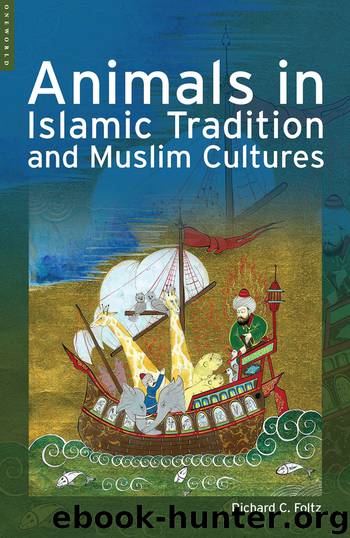Animals in Islamic Traditions and Muslim Cultures by Foltz Richard;

Author:Foltz, Richard;
Language: eng
Format: epub
Publisher: Oneworld Publications
Most of such un-Islamic businesses are flourishing in the Islamic countries due to the ignorance of the consumer public. People do not know how the chickens are being reared and how they are being fed on chemical nutrients to fatten fast and to produce more and more eggs. Fowls and other food animals are no longer creatures of God; they are numbers on their computers. After all, computers can give the breeders up-to-the-minute figures of profit and loss at the touch of a button, while God’s reckoning is a long way off in the Hereafter. If only the average, simple and God-fearing Muslim consumers of such food animals knew the gruesome details about the Westernized meat industry in their own Islamic countries, they would become vegetarians rather than eat such sacrilegious meat . . . The least the Muslim ‘Ulama’ can do is inform the lay public about how their food is being produced, so that people can – with knowledge – decide what to do about it.15
Himself a lifelong vegetarian, Masri shied away in his published writings from actually advocating a vegetarian diet for Muslims, merely suggesting it is a choice Muslims may wish to make once they know what is really going on. “Some may decide,” he writes, “that the products of intensive factory farms are not suitable, both from the religious and the health points of view, and seek more naturally produced eggs and meat; or give up eating meat altogether.”16
Still, near the end of his treatise Masri allows himself to wonder “why Islam, with all its concern for animals, has allowed its followers to consume their meat and did not ask them to become vegetarian, like some other religions.” He just as quickly shelves the question, however, saying merely that we should “accept the fact that Islam has allowed the slaughter of animals for food and see what instructions it gives us to ensure humane slaughter, with as little pain to the victim as possible.”17
Masri states his position far more strongly in a video he made near the end of his life in 1993. Titled Creatures of God, this low-budget, 27-minute film was produced by the same organization that published Masri’s two books on animals, the International Association Against Painful Experiments on Animals (IAAPEA) based in Petersfield, England. The format is that of a lecture (or sermon) in Arabic on a bare set, with summarized voice-overs in English, interspersed with cutaway shots of various forms of animal abuse occurring both in Muslim societies and in the West.
Unlike in his books, in this videotaped presentation Masri actually argues that Muslims should consider becoming vegetarians, even to the point where some of his textual interpretations seem stretched. After laying out the conditions of factory farming and citing the familiar hadiths and Qur’anic verses about compassion, he says firmly that “We can no longer avoid the strong Islamic counsel in favor of a vegetarian diet.” Later he contends that “Islam teaches us that any killing is a grave sin, and can only be justified if life and limb are in grave danger.
Download
This site does not store any files on its server. We only index and link to content provided by other sites. Please contact the content providers to delete copyright contents if any and email us, we'll remove relevant links or contents immediately.
The History of Jihad: From Muhammad to ISIS by Spencer Robert(2507)
Nine Parts of Desire by Geraldine Brooks(2283)
The Turkish Psychedelic Explosion by Daniel Spicer(2246)
The First Muslim The Story of Muhammad by Lesley Hazleton(2159)
The Essential Rumi by Coleman Barks(1931)
1453 by Roger Crowley(1881)
The Last Mughal by William Dalrymple(1793)
Trickster Travels: A Sixteenth-Century Muslim Between Worlds by Davis Natalie Zemon(1783)
Muhammad: His Life Based on the Earliest Sources by Martin Lings(1569)
by Christianity & Islam(1564)
God by Aslan Reza(1561)
A Concise History of Sunnis and Shi'is by John McHugo(1511)
Magic and Divination in Early Islam by Emilie Savage-Smith;(1456)
No God But God by Reza Aslan(1436)
The Flight of the Intellectuals by Berman Paul(1397)
Art of Betrayal by Gordon Corera(1366)
Nothing to Envy by Barbara Demick(1327)
What the Qur'an Meant by Garry Wills(1322)
Getting Jesus Right: How Muslims Get Jesus and Islam Wrong by James A Beverley & Craig A Evans(1276)
